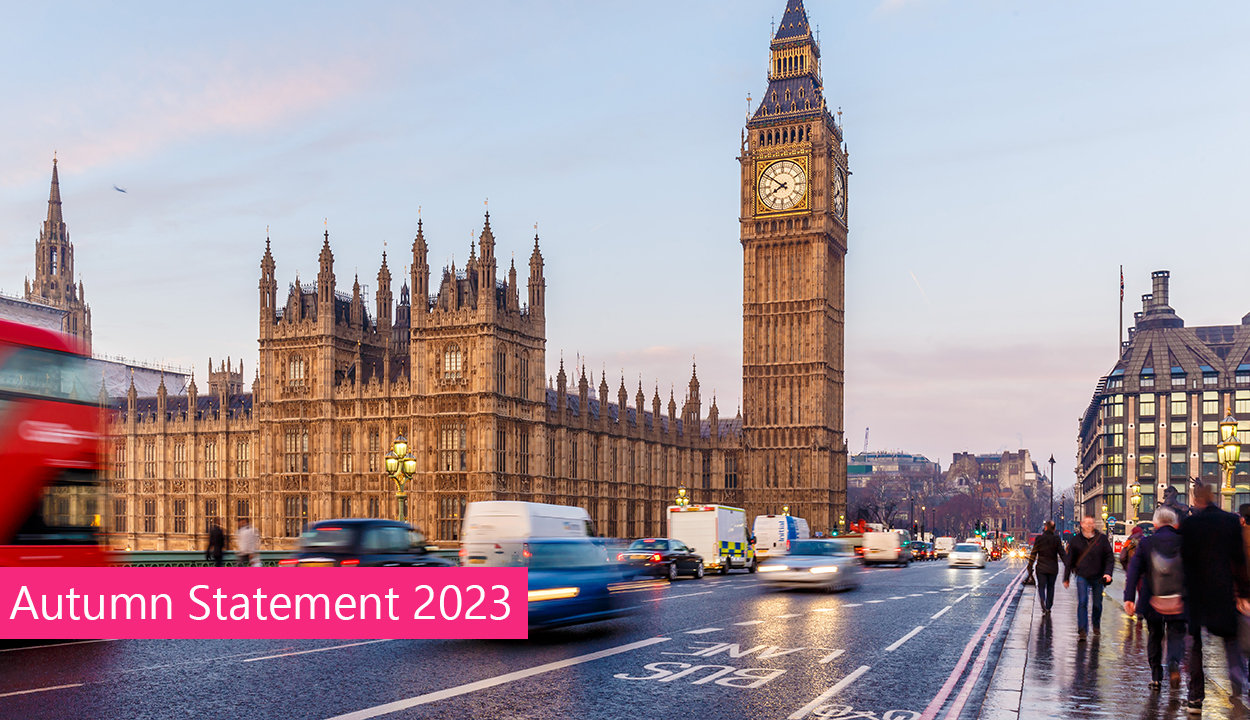Autumn Statement 2023: key tax announcements and commentary
As with any Budget or Autumn Statement speculation has been rife about what changes we might expect. Most of this speculation was around possible changes to Inheritance Tax or Stamp Duty Land Tax but these barely got a mention. Instead, the focus was primarily around National Insurance for individuals and relief for capital expenditure for businesses.
Taxation of individuals
Cutting taxes
With inflation falling and the economy growing, the government is apparently now in a position where it can start to return some money to taxpayers. Taxes are being cut for employees and the self-employed, by reducing National Insurance Contributions payable. This will allow working families to keep more of their hard-earned money.
Employees
The Chancellor has cut the rate of employee National Insurance by 2%, to 10%, this will take effect from 6 January 2024.
The combined rate of income tax and National Insurance for an employee paying the basic rate of tax will be 30%, down from 32%. An average worker, earning £38,900 per year will benefit from a £520 annual tax cut.
Self-employed
Currently the National Insurance system for the self-employed is overly complicated, with two separate classes of National Insurance payable in order to access state benefits. Therefore, the government will simplify the tax system by abolishing Class 2 self-employed National Insurance, to take effect from 6 April 2024. The details of this change are:
-
From 6 April 2024, self employed individuals with profits above £12,570, will no longer be required to pay Class 2 National Insurance contributions, but will continue to receive access to contributory benefits, including the State Pension.
-
Those with profits between £6,725 and £12,570, will continue to get access to contributory benefits, including the State Pension, through a National Insurance credit without paying National Insurance contributions.
-
Those with profits under £6,725 and others who pay voluntary Class 2 National Insurance contributions to get access to contributory benefits, including the State Pension, will continue to be able to do so.
- The main rate of Class 2 National Insurance will not increase in April 2024 and remain at the current rate of £3.45 per week for 2024-25.
Together with the above, the Chancellor has also cut the rate of Class 4 self-employed National Insurance by 1%, to 8%, this will take effect from 6 April 2024.
The combined reduction in National Insurance will result in an average self-employed-individual, with profits of £28,200, saving £350 in 2024-25.
Business taxes
Research and development
There have been various changes announced to R&D tax reliefs over the last 12 months. Some of the more significant changes included;
For expenditure incurred on or after 1 April 2023;
-
Reducing the SME R&D ‘enhancement’ amount from 130% to 86%
-
Increasing the Research and Development Expenditure Credit (“RDEC”) from 13% to 20%
- Decreasing the amount of repayable credit under the SME scheme to from 14.5% to 10%
For all claims from August 2023, claimants now have to submit an additional form to HMRC prior to their R&D claim containing various additional information.
Today, the Chancellor confirmed that an RDEC scheme will apply to all companies regardless of their size. Rather than SMEs claiming the more generous ‘enhanced expenditure’ deduction, they will now also claim the ‘above the line’ credit, which is effectively a taxable credit based on 20% of R&D expenditure.
This was already in consultation prior to the Chancellor’s statement today but has now been confirmed for accounting periods beginning on or after 1 April 2024. Two additional announcements made today were;
-
The RDEC is an ‘above the line’ credit which means it is subject to corporation tax. Loss making companies who claim RDEC are subject to a notional corporation tax charge, such that they would only be paid 75% of the credit (credit less 25% corporation tax rate). The Chancellor today confirmed that this notional tax charge would only be 19%, such that companies can receive 81% of the credit.
- A loss-making SME company with qualifying R&D expenditure of 30% or more of its total expenditure will be able to claim an intensive scheme relief, which is similar to the existing SME relief. A one year grace period will also be introduced, enabling a company which has claimed the SME relief previously but doesn’t meet the threshold the following year.
Even with these two changes, the benefit of claiming R&D for SMEs will soon be significantly less than it has been historically.
By way of example, before all of the above changes, a profit making SME with £100,000 of R&D expenditure would receive an additional deduction of £130,000, which based on a 25% tax rate would mean tax relief of £32,500. Once they transition to the new RDEC scheme, they will receive a credit based on 20% of the expenditure, being, £20,000, which is then subject to tax at 25%, such that they only receive tax relief of £15,000.
A loss making SME with R&D expenditure of £100,000 would have previously been able to surrender its losses and receive a payable credit of £33,350. Under the new RDEC scheme, this would only be £16,200 (£100,000 x 20% less 19% tax).
We are expecting some further clarity in the coming weeks regarding how subcontractor costs/externally paid workers will be factored into the new SME RDEC scheme, as there are currently differences to the treatment of these between the SME and Large company RDEC scheme.
There has also been enhanced HMRC compliance activity regarding R&D recently which we can expect will continue for the foreseeable future.
Capital allowances: Full Expensing
The Chancellor announced that the ‘Full Expensing’ capital allowance regime, which was introduced in the spring budget as a temporary measure, would now be made permanent. This, he said, represented “the largest business tax cut in modern British history.”
Full Expensing is a capital allowance available to companies only, which provides 100% tax relief on purchases of qualifying plant and machinery, or 50% relief for ‘special rate expenditure.’ Unlike the Annual Investment Allowance which also provides 100% relief, there is no annual limit on the amount of expenditure that can qualify, meaning that larger investment projects can also benefit.
Where 100% Full Expensing relief is available, companies will effectively get £250K off their corporation tax bill for every £1M invested, in the same tax year. The Chancellor said this means that the UK now has the “most generous capital allowances” in the G7.
Capital allowances have fluctuated hugely over the last few years, causing a real headache for businesses. Companies will welcome today’s announcement as it provides clarity and certainty for future investment projects, making longer- term investment planning easier.
For further details about Full Expensing, including the types of assets that qualify for the allowance, and when it should be claimed, please see our article on Full Expensing .
Enterprise Management Incentives (‘EMI’)
As previously announced, the time limit for notifying HMRC of a grant of EMI options will be extended. Currently, HMRC must be notified within 92 days of the grant. For EMI options granted on or after 6 April 2024, this deadline will be extended to 6 July following the end of the tax year in which the option is granted, thereby giving employers more breathing space to make the notification.
Enterprise Investment Scheme (‘EIS’) and Venture Capital Trusts (‘VCT’) scheme
Currently the EIS and VCT scheme legislation contain sunset clauses which limit income tax relief to shares issued before 6 April 2025. These sunset clauses will now be extended to 6 April 2035, meaning that income tax relief for EIS and VCT investments will continue to be available for the foreseeable future.
Tax avoidance
The Autumn Statement announced two new measures to introduce tougher consequences for promoters of tax avoidance schemes. This will include a new criminal offence for promoters who continue to endorse their schemes after receiving a ‘Stop Notice’ from HMRC. HMRC will also be given new powers to bring disqualification orders against directors of companies involved in promoting tax avoidance, including any other individuals who control or exercise influence over a company.
If you have any questions about the above, or would like more information specific to your circumstances, please enter your email address below and we will get in touch:
Related View All













